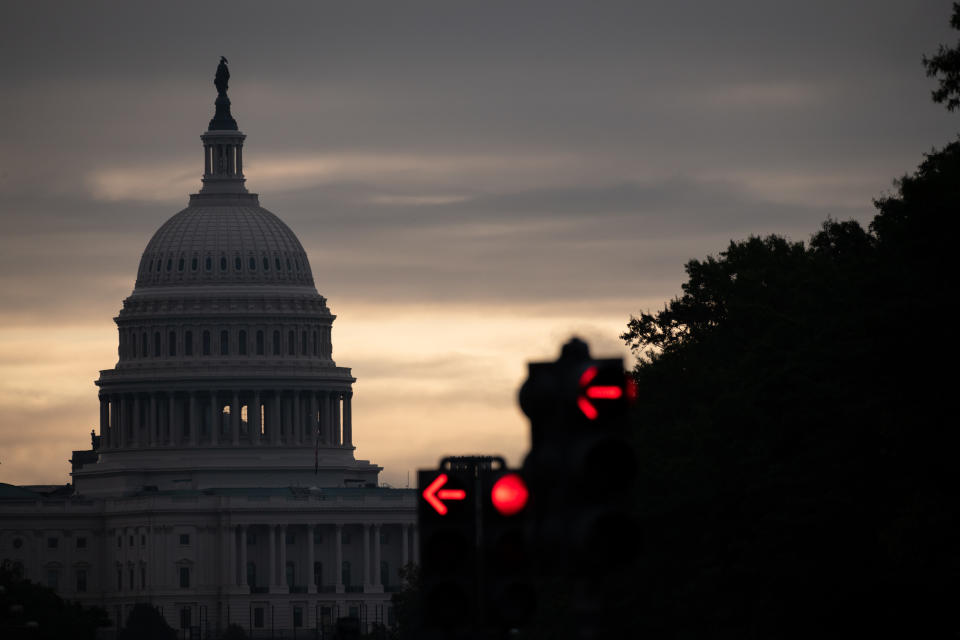Democrats Battle Over Cuts to Biden’s Agenda

With just over two weeks to go before a self-imposed October 31 deadline, the White House and congressional Democrats are reportedly agonizing over the overall size and specific details of their Build Back Better economic plan.
Here’s the one-paragraph summary of where things stand, via Bloomberg’s Nancy Cook and Laura Davison:
“Speaker Nancy Pelosi and Democratic centrists want to scale back the bill to focus on a handful of well-funded programs that can be quickly implemented, so Democrats can boast about the accomplishments in 2022 mid-term campaigns. But progressives want to keep the legislation expansive, even if programs are partially funded or expire after only a few years.”
Democrats reportedly are debating whether to slash funding for a paid leave program from $494 billion to $300 billion, which would mean covering three or four weeks of leave rather than the 12 proposed by President Joe Biden and included in a House version of the plan.
They’re also discussing a potential choice between including Biden’s plan for free universal pre-K and his plan to make daycare more affordable.
And they’re reportedly likely to axe or weaken at least one of the major climate provisions under discussion, making it easier for coal and natural gas plants to get clean energy funds in a bid to win over Sen. Joe Manchin (D-WV).
Plans to expand Medicare coverage to include dental, vision and hearing benefits could be on the chopping block, despite the demands of Sen. Bernie Sanders (I-VT) and House progressives, and limiting the new child tax credit has also come under discussion.
White House pushing to move forward: If perchance you’re getting tired of hearing about the legislative sausage-making, know that the White House seems to be getting tired of it, too. Jake Sherman of Punchbowl News reports that White House patience is running out. One unnamed source close to the White House tells Punchbowl:
“The White House feels that serious progress has been made and that members representing each viewpoint are operating in good faith, but that the time for negotiations is nearing an end because there is an urgency to pass both components of the President’s economic plans for the middle class and that now, because of the needs of families, is the time to be decisive and get down to brass tacks.”
How do you solve a problem like Manchinema? Among the many factors that have complicated negotiations, the two Democratic senators who objected to the initial $3.5 trillion price tag for the package —Manchin and Kyrsten Sinema — reportedly are at odds over key elements of the plan.
“Manchin and Sinema want very different things, both in terms of revenue and programs,” one source told Politico. “If you just took their currently presented red lines you wouldn’t have enough left to get this past progressives in the House and Senate. It wouldn’t raise enough money and it wouldn’t do enough big programs.”
Sinema reportedly is objecting to prescription drug pricing reforms, including a plan to allow Medicare to negotiate prices with pharmaceutical companies — a proposal that is both popular and a crucial source of revenue to help pay for other elements of the Democratic plan.
“The most robust version of this plan to allow Medicare to negotiate drug prices would bring in some $500 billion of revenue at the expense of the pharmaceutical industry,” Politico noted on Wednesday. “But we’re told that Democrats would be lucky if they managed to convince Sinema to support a version of drug pricing reform that raises even $200 billion. That’s not enough to fund the expansion of Medicare benefits that Sen. Bernie Sanders (I-Vt.) wants or the expansion of the ACA that Speaker Nancy Pelosi wants.”
Manchin, meanwhile, is reportedly open to drug pricing reforms but is also pushing for his own plan to tax prescription opioids.
Manchin, from coal-producing West Virginia, and Sinema, who started her career in Arizona’s Green Party, are reportedly also miles apart on climate proposals. “Here’s where Manchin is really driving his colleagues crazy,” Politico said: “There are tens of thousands of coal jobs in West Virginia that are going to disappear as the economy transitions to clean energy. But when Democrats have proposed expensive programs to subsidize those workers’ income as they find new jobs, Manchin, we’re told, ‘rejected it out of hand,’ calling the idea ‘welfare.’”
The bottom line: Senate Majority Leader Chuck Schumer said in a letter Thursday that Democrats are still aiming to pass their economic plan this month. (He also announced that he would set a vote for next Wednesday to start debate on voting rights legislation).
"To pass meaningful legislation, we must put aside our differences and find the common ground within our party," Schumer wrote. "As with any bill of such historic proportions, not every member will get everything he or she wants. I deeply appreciate the sacrifices made by each and every one of you. At the end of the day, we will pass legislation that will dramatically improve the lives of the American people. And we must aim to do that in the month of October."
Despite that goal, and White House pressure, Democrats still have many differences to resolve before they can be sure they’ll have the votes they need. While the October deadline is tied to the expiration of funding for surface transportation programs, that funding has already been extended once, meaning the month-end deadline might be less than firm.
